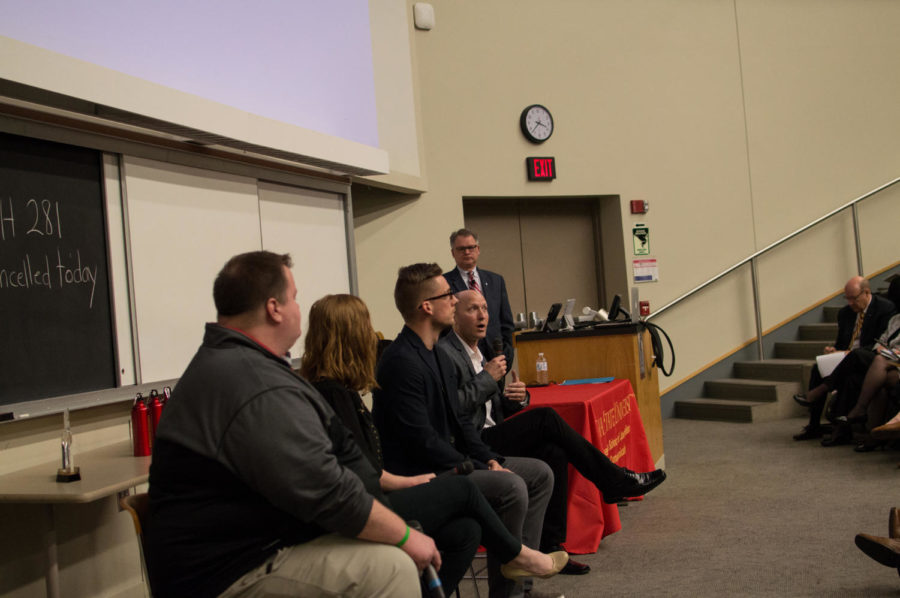Panel discusses social media effects
Charlie Coffey/Iowa State Daily
The 2015 Futures Forum panelists lead a discussion with the crowd about social media in the workplace. The panel was moderated by Rick Phillips and the panelists includes Aaron Hepker, Emilee Richardson, Justin Wise and Don Moxley.
April 9, 2015
Social media is slowly but surely becoming a popular form of communication and interaction in our society. The Future Forum panelists Aaron Hepker, Justin Wise, Emilee Richardson and Don Moxley, spoke about social media in the professional world Thursday evening in the College of Design Building.
“Don’t put anything out on social media that you wouldn’t want to show up on the New York Times,” said Moxley, senior vice president of FleishmanHillard.
Social media has shifted from personal use to professional use. When anyone has access to your blog, Twitter, Facebook or Instagram, it gets a little harder to separate personal use from professional use.
Companies are becoming social media friendly. Some are big companies like Netflix, while others are small local businesses.
In the professional world, companies use social media as a platform to build their brand and brand image.
“Through social media you are building relationships,” said Wise, author and founder of Think Digital Academy. “You want people to know, trust and like your brand.”
Using social media as a business platform is a fairly new concept. Businesses are trying to figure out how to use it properly and get the most out of it. Using social media for their business is a learning process.
“Engaging people in current news relative to what you’re trying to promote through social media [is good]. Know where your audience is and what they’re looking for on that network,” said Richardson, marketing and communication manager of the Science Center of Iowa.
Determining what to post, where to post and how to post is integral. Whatever is posted on the Internet or social media sites is not private. A lot of users post things that can have a negative or positive consequence.
“You can experiment but be tasteful,” Richardson said. “Being relatable and experimenting with the brand are positive things you can post on social media.”
Experimentation comes with limitations. It is important to be conscious of the effects that your post could create.
“Technology will show you who you are. Social media will expose who you are as a person,” Wise said.
The panelists discussed the topic of journalists on social media and how they can improve their posts.
“Be very careful about how you treat the content your posting because it can change how readers view you and how you cover a story,” said Hepker, digital content director of WHO-TV.
Tweeting news in only 140 characters can be difficult and takes practice to perfect it, which is an important skill for reporters and journalists to learn.
“You have to craft your tweet to get as much pull as you can, but also send out multiple follow-up tweets,” Hepker said.
Attacking controversial topics via social media can be very tricky but the brand has to know what topics it is willing to speak out for and the repercussions of that.
“Brands have to accept the fact that they are going to lose followers when you take a stand but it’s for the greater good,” Moxley said.
The online world is always changing. Personal or professional, it is important to know how to use social media successfully.







